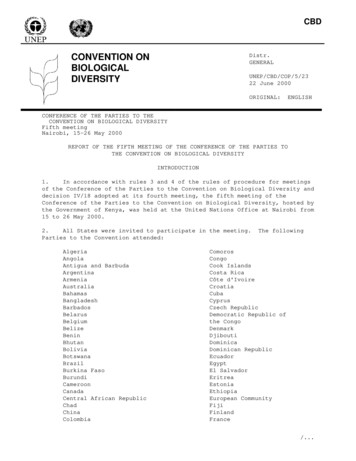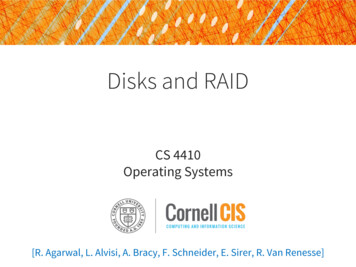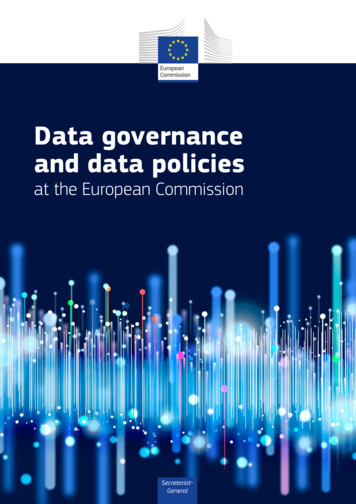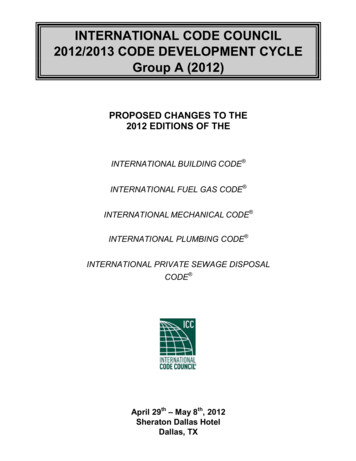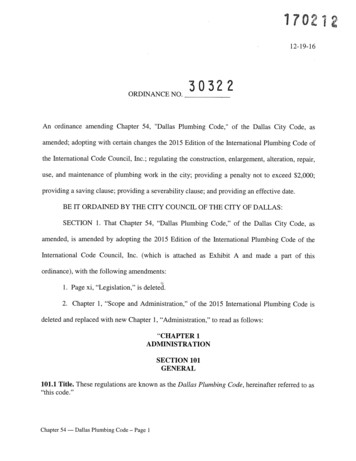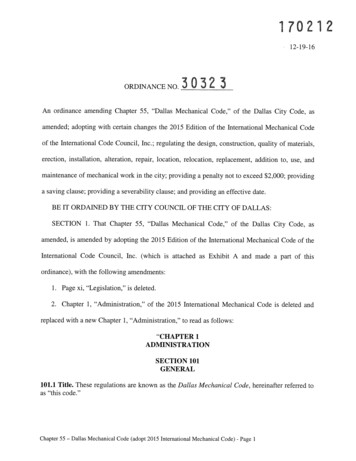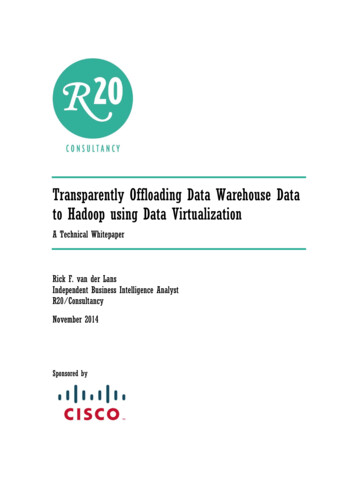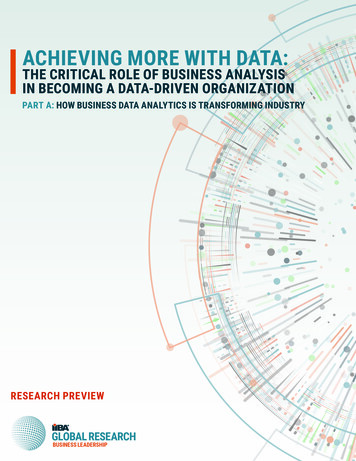
Transcription
ACHIEVING MORE WITH DATA:THE CRITICAL ROLE OF BUSINESS ANALYSISIN BECOMING A DATA-DRIVEN ORGANIZATIONPART A: HOW BUSINESS DATA ANALYTICS IS TRANSFORMING INDUSTRYRESEARCH PREVIEWGLOBAL RESEARCHBUSINESS LEADERSHIP
Table of ContentsExecutive Summary. 3Scope of Our Research. 5For more information, visithttps://www.iiba.org/corporateGLOBAL RESEARCHBUSINESS LEADERSHIPGThis research is an IIBA Global CorporateProgram report focusing on business leadershiptrends. The International Institute of BusinessAnalysis (IIBA ) Global Corporate Programprovides the support and resources organizationsneed to build business analysis capabilities anddrive professional development and growth. IIBAGlobal Research provides insight into the futureof business analysis and how business analysisimproves business outcomes.BU
Executive SummaryCompanies that can bridge the dividethrough business analysis will havea competitive advantage and be wellpositioned to sustain it.Achieving More with Data, Part A analyzes theforces shaping the use of business data analyticsat companies and the strategies, including the useof business analysis professionals for transformingto a data-driven organization. The pace oftechnology and the shifting balance of powercaused by disruption have combined to acceleratethe adoption of more complex analytics tools. Interms of capability, today’s companies have notkept up with the pace that data and analytics aresetting. This has created gaps in execution andfalse starts and has led to a significant waste oftime and money. The results to date have beenunderwhelming – close to 90%1 of initiatives donot go beyond pilot. Of those that do, half of themfall short of expectations, and 22%2 are consideredoutright failures.International Institute of Business Analysis(IIBA ) spoke to a number of business leaders,consultancies, and tech firms to betterunderstand the reasons behind these projectmisfires. Many of the challenges center on themissing piece of business analysis practices– a measured approach to aligning solutionswith problems and ensuring a framework ofpeople, processes, and technologies designedto optimize business results. Furthermore, ourstudy identified some causes leading to the gapbetween expectations and reality: Misunderstanding the fundamental businessproblem and expectations, leading tosolutions that don’t solve the problem. Poor data quality, management, andgovernance, which results in analytics modelsthat are not technically sound and producequestionable results. This also contributesto a lack of buy-in to an organization’s datadriven culture. Failure to rethink and the possibilities ofreimagining processes, which leads tobusiness data analytics initiatives realizingonly a fraction of their potential. Inability to manage the continuing tensionbetween societal needs, regulators, andbusinesses. Companies are struggling overtough questions of explainability, bias, andequation of trust, value, and access rights.It is simple to brush these off as rookie mistakesand growing pains, but the stakes are too high.Data and analytics are ushering in the largestchange in business that we have seen in over adecade. Companies do not have the luxury oftime on their side, nor do they have a second shotat it if they get any of the above factors wrong.The business analysis professional is alsointegral to the success of the data scienceteam by translating the organization’sneeds, prioritizing efforts, and assessingwhich solutions are practical.Achieving More with Data: The Critical Role of Business Analysis in Becoming a Data-Driven Organization3
Business analysis professionals, in companiessuch as AB InBev and TD Bank, ensure thatanalytics solutions meet business requirementsand keep decision makers data-informed so thatthey can directly connect analytical insights toactions and measurable results. The businessanalysis professional is also integral to thesuccess of the data science team by translatingthe organization’s needs, prioritizing efforts, andassessing which solutions are practical. Best inclass firms have business analysis professionalsthat connect business stakeholders to technicaland data solution teams. The lack of effectivebusiness analysis leads to many of the challengescompanies are experiencing and also contributesto analytics projects falling short of expectations.IIBA’s research found a clear need for businessanalysis professionals to provide some of themissing pieces in forging a data-driven culture.The business analysis discipline is at a crossroads.To be effective, business analysis professionalsmust deliver a specific set of capabilities, leveragecertain techniques, and focus on unique layers ofvalue when they approach data initiatives.Regardless of the urgency, it isimportant to take a step back andprepare for change. Companies thatrush into business data analyticswithout having all the pieces in placetypically develop solutions that miss themark, have poor data quality, and rely onintuition and gut over data. This won’tcut it in the digital economy.Data and analytics are shaping the futureof business. Part of the story is technology,particularly around folding data with intuition andredesigning processes that combine technologyand the human touch. However, the mostsignificant part of the change will involve peopleand culture. The good news is that analytics holdsa lot of promise and potential, and we are stillearly on. Companies that can bridge the dividethrough business analysis will have a competitiveadvantage and be well positioned to sustain it.4Achieving More with Data: The Critical Role of Business Analysis in Becoming a Data-Driven Organization
Scope of Our ResearchAchieving More with Data focuses on the forcesat work, the current state of analytics, anddemonstrating the value of business analysisprofessionals. The first part of this report focuseson the current state of analytics and its role increating data-driven organizations. The latter halfof this study establishes the value of businessanalysis in data-led initiatives.Achieving More with Data is part of InternationalInstitute of Business Analysis’ strategic globalresearch for 2021. Along with a companionpiece on Agile business practices, IIBA’sresearch assesses the role of a business analysisprofessional in the data economy.Our subsequent research will include thefollowing: Over two dozen interviews with corporateleaders, business consultancies, academia,and analytics tech firms. An expert panel of data science thought leaders. A survey conducted with over 300 businessanalysis professionals, IT, and line of businessdecision-makers.Figure 1 illustrates IIBA research inputs anddeliverables for the research program.HypothesisProperly engaged, business analysis professionals add value to businessdata analytics projects, and drive better results.DeliverablesAchieving More with Data: The Critical Role of Business Analysis in Becoming a Data-Driven OrganizationHow Business AnalysisImproves Outcomes inData Analytics ProjectsPart A: How Business Data Analytics isTransforming IndustryPart B: Five Key Business DataAnalytics CapabilitiesThree Dozen One-on-oneInterviewsMeasuringBusiness GainsExecutive ReportPart C: Data Analytics Survey. 300surveys quantify capabilities leading toproject success and the impact of businessanalysis in driving increased ROI or reducedfailure rates in data analytics projects.Part E: A Strategic Approach to Analytics:Driving Value through Business AnalysisThe executive report presents sevenrecommendations on key skills required toimprove performance on data analytics toexecutive.Part D: Data Analytics InfographicThe Impact of Business Analysison Data Analytics ProjectsExpertPanelExistingIIBA Body ofKnowledgeSummer 2021SurveyResearch InputsFigure 1, IIBA Research ApproachSource – IIBA, 2021Achieving More with Data: The Critical Role of Business Analysis in Becoming a Data-Driven Organization5
UNLOCKING UPSKILLING64%OF RESPONDENTS SAIDTHEIR ORGANIZATIONDOES NOT OFFERA DEFINEDCAREER PATHBUILD BUSINESS DATA ANALYTICS CAPABILITY49%* OF COMPANIES ARE USING DATA ANALYTICS MORE.IS YOUR ORGANIZATION READY 2IIBA Global Corporate Program enables business, HR, and practice leaders to align training with businessneeds to maximize potential within their organizations. It is committed to providing members with theresources and professional development opportunities to enable them drive business success. Standardize methodologies and work with the industry best practices Gain access to tools and resources to increase consistency, efficiency, and effectiveness Accelerate career progression and align professional development with business needs Engage in a community of like-minded leaders and gain exclusive insightsVisit iiba.org/corporate-program to explore key benefitsEmail corporatemembership@iiba.org for more informationSources1. IIBA 2020 Global Salary Survey Report2. ses-are-using-more-analytics-to-survive-covid-19/
GLOBAL RESEARCHBUSINESS LEADERSHIPTrusted Insights for Challenging Business ProblemsIIBA’s Global Research provides a broad view of the topical information, insights, and trends thatinfluence the global business analysis profession. Use these trends to support your organization in digitaltransformation, data analytics, agile analysis, and more.Bridging the Gap analyzes the forces shaping the use of data and analytics at companies and the strategies,including the use of Business Analysis Professionals, for transforming to a data-driven organization. Thisresearch includes over two dozen interviews with corporate leaders, business consultancies, academia,and analytic tech firms, an expert panel of data science thought leaders, plus a survey of over 300 BusinessAnalyst Professionals, IT, and line of business decision-makers.For more information visit IIBA.org 2021 International Institute of Business Analysis. IIBA and the IIBA logo are registered trademarks of the International Institute of Business Analysis.
The International Institute of Business Analysis (IIBA ) Global Corporate Program provides the support and resources organizations . to analytics projects falling short of expectations. IIBA's research found a clear need for business analysis professionals to provide some of the

